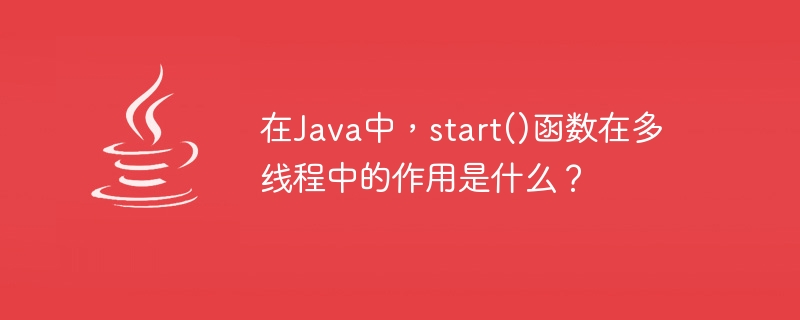

In Java, concurrency and multithreading are basic concepts that can promote the simultaneous execution of two or more parts of a program to maximize CPU utilization. The start() method plays a key role in this process. This article takes an in-depth look at how the start() function works in Java multithreading, explaining its purpose and importance.
Multi-threading is one of the core features of Java, allowing multiple sequences of code (called threads) to execute simultaneously in a single program. By enabling concurrent execution, Java can utilize CPU resources more efficiently, especially on systems with multiple processors or cores.
In Java, threads can be created by extending the Thread class or implementing the Runnable interface. Once the Thread object is created, you can use the start() method to start the execution of the thread.
start() method is part of the java.lang.Thread class. Its main purpose is to create a new thread and execute the run() method of the Thread class or Runnable interface at the same time.
This is a simple example -
public class MyThread extends Thread {
public void run() {
System.out.println("Thread is running");
}
public static void main(String[] args) {
MyThread t1 = new MyThread();
t1.start();
}
}
Thread is running
In the above code, t1 is an instance of MyThread, which inherits the Thread class. The start() method is called on t1, causing the run() method to be executed in a separate thread.
Calling the start() method is the key to starting a new thread. It will create an independent call stack for the new thread. Here are a few reasons why the start() method is crucial:
Start parallel execution: The start() method notifies the Java Virtual Machine (JVM) to allocate a new thread, and then the thread executes the code within the run() method. This allows threads to run independently and in parallel with the main thread.
Reserve multi-threading: If the run() method is called directly instead of calling start(), it will be executed in the same thread, which conflicts with the purpose of multi-threading. The start() method ensures that the run() method is executed in a separate thread.
Adjust the thread life cycle: In addition to starting the thread, the start() method also puts the thread in a "runnable state". It allows the thread scheduler to manage the execution relationship of this thread with other threads in the program
Understanding the life cycle of threads in Java is the key to understanding the role of the start() method. The thread life cycle includes several states, such as new, runnable, running, blocked, waiting, timed waiting, and terminated. When a new Thread object is created, it is in the New state. The start() method moves the thread to the Runnable state, which can be converted to the Running state by the thread scheduler.
The start() method in Java multithreading is the catalyst for starting threads. It plays an important role in managing the life cycle of threads and ensuring parallel execution of the run() method. Understanding this basic functionality is critical to effectively leveraging the power of multithreading in Java and implementing efficient and high-performance applications.
The above is the detailed content of In Java, what is the role of start() function in multi-threading?. For more information, please follow other related articles on the PHP Chinese website!




